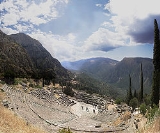
Delphi
Overview
Greek language
Greek is an independent branch of the Indo-European family of languages. Native to the southern Balkans, it has the longest documented history of any Indo-European language, spanning 34 centuries of written records. Its writing system has been the Greek alphabet for the majority of its history;...
, ðelˈfi) is both an archaeological
Archaeology
Archaeology, or archeology , is the study of human society, primarily through the recovery and analysis of the material culture and environmental data that they have left behind, which includes artifacts, architecture, biofacts and cultural landscapes...
site and a modern town in Greece
Greece
Greece , officially the Hellenic Republic , and historically Hellas or the Republic of Greece in English, is a country in southeastern Europe....
on the south-western spur of Mount Parnassus
Mount Parnassus
Mount Parnassus, also Parnassos , is a mountain of limestone in central Greece that towers above Delphi, north of the Gulf of Corinth, and offers scenic views of the surrounding olive groves and countryside. According to Greek mythology, this mountain was sacred to Apollo and the Corycian nymphs,...
in the valley of Phocis
Phocis
Phocis is one of the regional units of Greece. It is part of the administrative region of Central Greece. It stretches from the western mountainsides of Parnassus on the east to the mountain range of Vardousia on the west, upon the Gulf of Corinth...
.
In Greek mythology
Greek mythology
Greek mythology is the body of myths and legends belonging to the ancient Greeks, concerning their gods and heroes, the nature of the world, and the origins and significance of their own cult and ritual practices. They were a part of religion in ancient Greece...
, Delphi was the site of the Delphic oracle
Pythia
The Pythia , commonly known as the Oracle of Delphi, was the priestess at the Temple of Apollo at Delphi, located on the slopes of Mount Parnassus. The Pythia was widely credited for her prophecies inspired by Apollo. The Delphic oracle was established in the 8th century BC...
, the most important oracle
Oracle
In Classical Antiquity, an oracle was a person or agency considered to be a source of wise counsel or prophetic predictions or precognition of the future, inspired by the gods. As such it is a form of divination....
in the classical Greek world, and a major site for the worship of the god Apollo
Apollo
Apollo is one of the most important and complex of the Olympian deities in Greek and Roman mythology...
after he slew the Python
Python (mythology)
In Greek mythology, Python was the earth-dragon of Delphi, always represented in Greek sculpture and vase-paintings as a serpent. He presided at the Delphic oracle, which existed in the cult center for his mother, Gaia, "Earth," Pytho being the place name that was substituted for the earlier Krisa...
, a deity who lived there and protected the navel
Omphalos
An omphalos is an ancient religious stone artifact, or baetylus. In Greek, the word omphalos means "navel" . According to the ancient Greeks, Zeus sent out two eagles to fly across the world to meet at its center, the "navel" of the world...
of the Earth
Gaia (mythology)
Gaia was the primordial Earth-goddess in ancient Greek religion. Gaia was the great mother of all: the heavenly gods and Titans were descended from her union with Uranus , the sea-gods from her union with Pontus , the Giants from her mating with Tartarus and mortal creatures were sprung or born...
. Python (derived from the verb pythein, "to rot
ROT
The aviation term ROT stands for rate one turn, also known as a standard rate turn. All aircraft must be able to perform a standard rate turn....
") is claimed by some to be the original name of the site in recognition of the Python that Apollo defeated.

